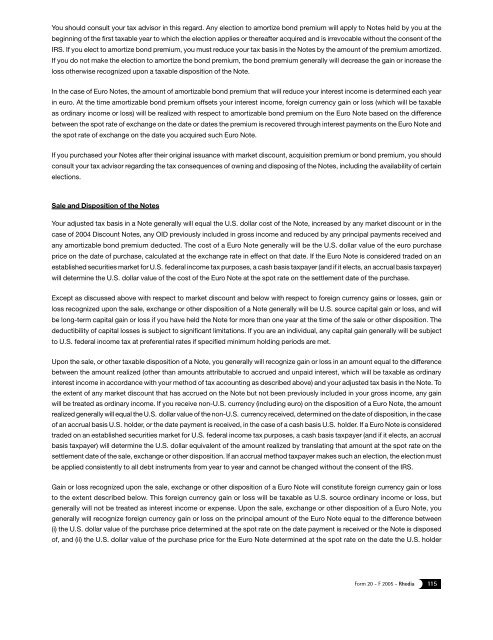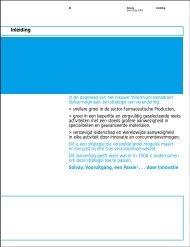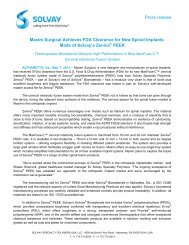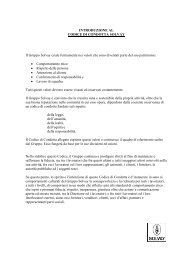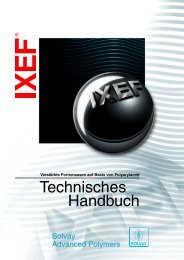Form 20-F 2005
Form 20-F 2005
Form 20-F 2005
Create successful ePaper yourself
Turn your PDF publications into a flip-book with our unique Google optimized e-Paper software.
You should consult your tax advisor in this regard. Any election to amortize bond premium will apply to Notes held by you at the<br />
beginning of the first taxable year to which the election applies or thereafter acquired and is irrevocable without the consent of the<br />
IRS. If you elect to amortize bond premium, you must reduce your tax basis in the Notes by the amount of the premium amortized.<br />
If you do not make the election to amortize the bond premium, the bond premium generally will decrease the gain or increase the<br />
loss otherwise recognized upon a taxable disposition of the Note.<br />
In the case of Euro Notes, the amount of amortizable bond premium that will reduce your interest income is determined each year<br />
in euro. At the time amortizable bond premium offsets your interest income, foreign currency gain or loss (which will be taxable<br />
as ordinary income or loss) will be realized with respect to amortizable bond premium on the Euro Note based on the difference<br />
between the spot rate of exchange on the date or dates the premium is recovered through interest payments on the Euro Note and<br />
the spot rate of exchange on the date you acquired such Euro Note.<br />
If you purchased your Notes after their original issuance with market discount, acquisition premium or bond premium, you should<br />
consult your tax advisor regarding the tax consequences of owning and disposing of the Notes, including the availability of certain<br />
elections.<br />
Sale and Disposition of the Notes<br />
Your adjusted tax basis in a Note generally will equal the U.S. dollar cost of the Note, increased by any market discount or in the<br />
case of <strong>20</strong>04 Discount Notes, any OID previously included in gross income and reduced by any principal payments received and<br />
any amortizable bond premium deducted. The cost of a Euro Note generally will be the U.S. dollar value of the euro purchase<br />
price on the date of purchase, calculated at the exchange rate in effect on that date. If the Euro Note is considered traded on an<br />
established securities market for U.S. federal income tax purposes, a cash basis taxpayer (and if it elects, an accrual basis taxpayer)<br />
will determine the U.S. dollar value of the cost of the Euro Note at the spot rate on the settlement date of the purchase.<br />
Except as discussed above with respect to market discount and below with respect to foreign currency gains or losses, gain or<br />
loss recognized upon the sale, exchange or other disposition of a Note generally will be U.S. source capital gain or loss, and will<br />
be long-term capital gain or loss if you have held the Note for more than one year at the time of the sale or other disposition. The<br />
deductibility of capital losses is subject to significant limitations. If you are an individual, any capital gain generally will be subject<br />
to U.S. federal income tax at preferential rates if specified minimum holding periods are met.<br />
Upon the sale, or other taxable disposition of a Note, you generally will recognize gain or loss in an amount equal to the difference<br />
between the amount realized (other than amounts attributable to accrued and unpaid interest, which will be taxable as ordinary<br />
interest income in accordance with your method of tax accounting as described above) and your adjusted tax basis in the Note. To<br />
the extent of any market discount that has accrued on the Note but not been previously included in your gross income, any gain<br />
will be treated as ordinary income. If you receive non-U.S. currency (including euro) on the disposition of a Euro Note, the amount<br />
realized generally will equal the U.S. dollar value of the non-U.S. currency received, determined on the date of disposition, in the case<br />
of an accrual basis U.S. holder, or the date payment is received, in the case of a cash basis U.S. holder. If a Euro Note is considered<br />
traded on an established securities market for U.S. federal income tax purposes, a cash basis taxpayer (and if it elects, an accrual<br />
basis taxpayer) will determine the U.S. dollar equivalent of the amount realized by translating that amount at the spot rate on the<br />
settlement date of the sale, exchange or other disposition. If an accrual method taxpayer makes such an election, the election must<br />
be applied consistently to all debt instruments from year to year and cannot be changed without the consent of the IRS.<br />
Gain or loss recognized upon the sale, exchange or other disposition of a Euro Note will constitute foreign currency gain or loss<br />
to the extent described below. This foreign currency gain or loss will be taxable as U.S. source ordinary income or loss, but<br />
generally will not be treated as interest income or expense. Upon the sale, exchange or other disposition of a Euro Note, you<br />
generally will recognize foreign currency gain or loss on the principal amount of the Euro Note equal to the difference between<br />
(i) the U.S. dollar value of the purchase price determined at the spot rate on the date payment is received or the Note is disposed<br />
of, and (ii) the U.S. dollar value of the purchase price for the Euro Note determined at the spot rate on the date the U.S. holder<br />
<strong>Form</strong> <strong>20</strong> - F <strong>20</strong>05 - Rhodia<br />
115


